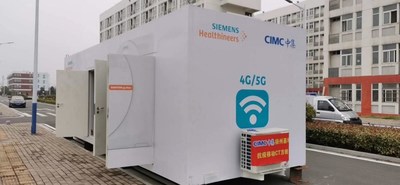The first mobile CT scan cabin produced by Yangzhou Tailee Special Equipment Co Ltd has been put into use in a hospital in Huanggang, one of the worst hit cities by the coronavirus outbreak in Hubei province, to help with the battle against the epidemic.
SHENZHEN, China, March 9, 2020 /PRNewswire/ -- The first mobile CT scan cabin produced by Yangzhou Tailee Special Equipment Co Ltd (A member enterprise of CIMC) has been put into use in a hospital in Huanggang, one of the worst hit cities by the coronavirus outbreak in Hubei province, to help with the battle against the epidemic.
As of 9 am on March 2, a total of 106 CT scans had been made in the mobile cabin, which was transported to Huangzhou General Hospital in late February.
"Normally, it takes 20 days to finish the process from research and development, design to manufacturing. But emergency of delivering the equipment to hospitals prompted us to work faster. We managed to finish it in just six days, with more than 100 employees working day and night," said Zhao Youshan, general manager of Yangzhou Tailee, an affiliate of Chinese leading logistics and energy equipment supplier China International Marine Containers (Group) Ltd.
According to Zhao, the mobile cabin could be put into use in 36 hours at the soonest upon arrival at the hospital, after assembly, installation of CT equipment and test for protective effect.
The company received an order of providing a total of 25 mobile CT scan cabins for hospitals in Huanggang, Ruyang and Xinyang in Henan province, and Liuzhou in Guangxi Zhuang autonomous region.
Aside from the one for the Huanggang hospital, the others are also being transported to the destinations.
"When the mobile cabins arrive at the hospitals, they will be equipped with 5G network, which will enable medical professionals to guide the operation of CT equipment and make diagnosis remotely," Pan Jiabing, marketing director of the company, said.
The company has dispatched workers to provide necessary services to ensure the products can be used as quickly as possible, Zhao said.
CT scan is an important method in screening and diagnosing the coronavirus, but there is not sufficient rooms in hospitals to conduct it due to the large number of patients. As building traditional diagnosis rooms requires a long period of time, mobile cabins become a good alternative.
The mobile cabins, each covering 27 square meters, are built from container modules, which means that they can be moved easily and reused. Each cabin covers a doctors' operating room and a CT inspection room, which are separated to avoid transmission.
To ensure CT equipment works well -- the optimal temperature for CT equipment to work is between 18 and 22 degrees centigrade, the company applies a "sandwich"-style structural pattern in its mobile cabins for thermal insulation, which involves various materials including aluminium alloy plate and bamboo carbon fiber plate used in thermal insulation layer and additional protection in interior and exterior decorative layers.
Contact: zhongkun.deng@cimc.com
![]() View original content to download multimedia:http://www.prnewswire.com/news-releases/cimc-produced-mobile-cabins-put-into-use-in-chinese-hospitals-to-help-combat-coronavirus-301019506.html
View original content to download multimedia:http://www.prnewswire.com/news-releases/cimc-produced-mobile-cabins-put-into-use-in-chinese-hospitals-to-help-combat-coronavirus-301019506.html
SOURCE CIMC





